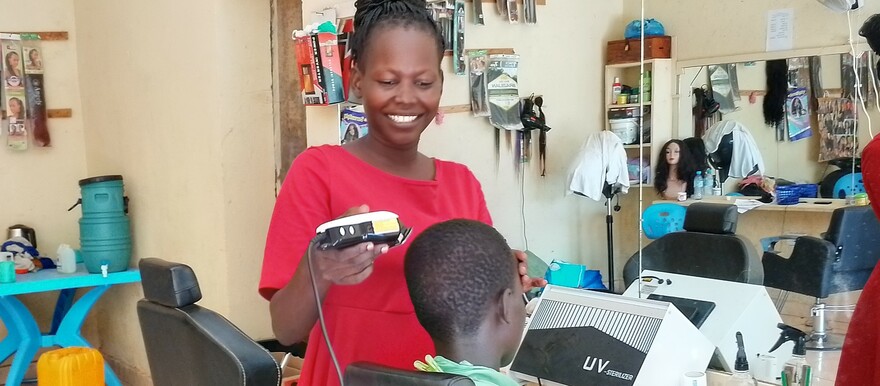A 28-year-old woman barber and saloonist in Torit town of Eastern Equatoria State says her life has changed greatly since she embarked on the business.
Jaklin Ihure, a mother of four, and the provider to three other dependents, runs her business at Omoliha Market.
She says she was now able to eat well, access proper medical and send her children to school, despite the economic crisis in South Sudan.
A member of the Otuho community, Ihure hails from Oronyo Village, Bur Payam of Torit County. Her community believes the job she is doing should be done by men, but she believes she has changed the narrative and enjoys doing her work
“We plait women and shave the men. I am very happy that I am doing what I love,’’ she said, pointing out that she at first only plaited the women.
Ihure, who dropped out of primary school to get married, says it is good for a woman to contribute to the family kitty.
“I can earn up to 30,000 and 40,000 South Sudanese pounds in a day. I can now sustain the family without many challenges,” she disclosed.
On her achievements so far, Ihure said: “My achievements include being able to keep some seven children in school, feed them and take care of their medical bills.”
She acknowledged that there were cultural stereotypes regarding the job, and even negative talks from several quarters, bus she was determined to soldier on.
“Many people scold me for doing what they consider a man’s job. Some even consider me a spoilt woman, but I have got used to their sentiments. I often tell them what men can do, even women can do and that we need to change our culture that hinders development,” she said.
“In the beginning their scolding was painful, but with time I realized it was all for nothing. I was getting my money, she added.
Ihure said she was encouraging the girls, irrespective of their locations, that her work is unisex, and they can take it up and contribute to the community.
“If you want to do this work, you just need to go for practice or attend a training. I never attended any training, but just stared learning on the job, and I am now an expert.”
Majority women in South Sudan consider clear-cut roles for men and women. Ihure says this culture must stop as she discourages the women from taking up new challenges.
“I thank God that I never beg for anything from anyone, including my husband. I want others to emulate me,” she said.
She said that engaging in various productive activities eradicated crime, especially among the youth.
Ihure said she manages to strike a balance between her job and the domestic chores, including helping the children with homework.
“If I go home in the evening, I do all my chores till late at night. I wish I could have more time to play with the children and rest;” she said
To the men, she said: “I encourage them to stop sitting under trees, waiting to benefit from the efforts of others. Many of them prefer employment by NGOs which are hard to come by.”




